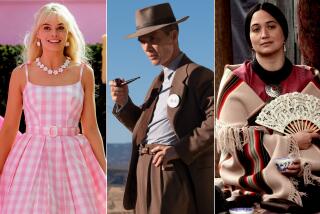Prolific producer with ‘new vision’
- Share via
Carlo Ponti, the prolific Italian producer of such internationally acclaimed films as “Doctor Zhivago” and “Blow-Up” and the longtime husband of Oscar-winning actress Sophia Loren, whom he discovered as a teenager in the 1950s and helped build into a star, has died. He was 94.
Ponti, who had been hospitalized for about 10 days with pulmonary complications, died Tuesday at a hospital in Geneva, his family said in a statement Wednesday.
“His death marks the end of an era for filmmaking because Ponti embodied a great and courageous push to innovate, promoted unforgettable talents, and enjoyed huge success,” Italian Culture Minister Francesco Rutelli said Wednesday.
During a decades-long career that reflected the rise of Italian neo-realism in the 1940s and the French New Wave in the 1960s, Ponti was a producer on about 150 movies, including Federico Fellini’s Oscar-winning best foreign language film “La Strada” (with then-partner Dino De Laurentiis), Jean-Luc Godard’s “Contempt,” Claude Chabrol’s “Bluebeard,” Jacques Demy’s “Lola” and Michelangelo Antonioni’s “Blow-Up,” “Zabriskie Point” and “The Passenger.”
The Ponti and David Lean-produced “Doctor Zhivago,” director Lean’s epic 1965 romantic drama set against the Russian Revolution, received an Oscar nomination for best picture.
Ponti also produced Vittorio De Sica’s “Two Women,” a 1960 Italian World War II drama that earned Loren an Oscar for best actress.
“I remember Carlo Ponti and our adventures together with great fondness, and I’m deeply saddened by the passing of a great producer and a dear friend,” De Laurentiis, who was besieged with interview requests Wednesday from Italian TV shows, said from Los Angeles via an intermediary.
Those who knew Ponti recalled his good nature and devotion to Loren, who reportedly was at his bedside when he died.
“I admired the way he was with Sophia Loren,” Kirk Douglas, who starred in the Ponti-De Laurentiis-produced 1955 film “Ulysses,” told The Times on Wednesday. “He took care of her, and his love for her was so apparent; he was always very solicitous, and I admired that very much.”
Merv Griffin, who knows Loren well and met Ponti a number of times, said he was “a very mild, sweet, gentle man, who, I guess, was almost a father image for Sophia, who was very devoted to him.
“Her beginnings were so difficult, and he guided her whole career and produced some great films and then fathered two wonderful young men” with Loren -- Carlo Ponti Jr., the music director and conductor of the San Bernardino Symphony Orchestra, and Edoardo, a filmmaker.
Rick Jewell, a film professor at USC’s School of Cinematic Arts, considers Ponti to be “one of the giants in the history of producing.”
“It’s an absolutely extraordinary kind of career just in terms of the range of film artists he worked with and the quality of the best films he produced,” Jewell told The Times last year.
Ponti, Jewell said, “was in the vanguard of a kind of new vision of the producer that emerged after World War II. Up to that point, producers had been pretty much local or national in the sense that if you were a Hollywood filmmaker you worked in Hollywood and that was it.
“What Ponti did, along with his onetime partner, Dino De Laurentiis, is they became international producers. Ponti produced most of his films in Italy, but he also worked in France, England, Hollywood and so on.”
As a producer, Ponti once said: “I like the cinema because you imagine a thing and after a while you see it. Just like building a house.... You construct a building from raw materials, and with films you give life to things that don’t exist.”
Born Dec. 11, 1912, in Magenta, Italy, an industrial town not far from Milan, Ponti earned a law degree from the University of Milan in 1934. He was practicing law in Milan in the late ‘30s when a friend asked him if he would take his place on the board of a film company.
Ponti soon became the Milan film company’s executive vice president. His first film as a producer was the 1941 Mario Soldati-directed drama “Piccolo Mondo Antico” (“Old-Fashioned World”). The plot of the film, which has been called “one of the key works from the Italian fascist era,” dealt with the 19th century patriotic movement to liberate Italian states from foreign domination. Considered anti-German by the Italian government, the film reportedly led to Ponti’s brief imprisonment.
After the war, he went to work as a producer at Lux Film in Rome. Among his producing credits during his several years at Lux were Luigi Zampa’s “A Yank in Rome” and “To Live in Peace.”
In 1950, Ponti began a successful producing partnership with De Laurentiis, during which they shared credits on a string of films through much of the ‘50s, including Roberto Rossellini’s “Europa ‘51”; Robert Rossen’s “Mambo,” and King Vidor’s “War and Peace,” starring Audrey Hepburn and Henry Fonda.
Ponti, who had produced postwar sex goddess Gina Lollobrigida’s first hit films and was instrumental in the early careers of other female Italian stars, once said: “I don’t like actors; I prefer women.”
He met Loren in Rome in 1951 when he was one of the judges for the finals of the Miss Rome beauty contest at an outdoor restaurant-nightclub overlooking the Colosseum: Seated on the judges’ platform, Ponti spotted the 16-year-old Loren in the front row with friends.
Then known as Sofia Lazzaro, the movie-acting hopeful was earning her living appearing in fumetti, soap opera-style stories in daily newspapers that were told in photo panels with the melodramatic dialogue in balloons over the characters’ heads.
Ponti was so impressed with the striking-looking teenager that he sent a contest official over to ask if she wanted to enter the contest.
She said yes, came in second, and met with Ponti afterward. As chronicled in the 1979 book “Sophia Living and Loving: Her Own Story” by A.E. Hotchner:
“I think I have a pretty good eye for talent,” Ponti told Loren. “I have made a career for Gina Lollobrigida, Alida Valli, and many, many others. You have an interesting face. I was watching you. The expressions. I suggest you come to my office tomorrow and we run a [screen] test.”
When he “first laid eyes on Sophia,” Ponti later told Hotchner, “I was struck more by her personality than by her looks. Something played off her that gave her a kind of illumination. I couldn’t believe she was a teenager. She was so mature, so focused in her desire to be an actress, so professional, yet at the same time timid and unsure of herself. It was an entrancing mix.”
After meeting Ponti, Loren’s career slowly began to build. He signed her to a personal contract in 1953 and thereafter, according to Alan Levy’s biography “Forever, Sophia,” he picked her gowns, films and parts. He also encouraged her to learn languages and recommended books for her to read, reshaping her personality and tastes in the process.
In time, Ponti and Loren began to quietly see each other.
“When we first met, he was just a kind producer who gave me a chance,” Loren is quoted as saying in Levy’s biography. “But the more we were with each other, all kinds of bonds held us together. He was friend, counselor, lover, father, teacher, everything. Without him, I was never a complete woman.”
Ponti was more than 20 years older and nearly four inches shorter than Loren, which gave rise to the joke, “He’s twice her age and half her size.”
By the time Loren was making “Woman of the River,” the 1955 Ponti-produced drama in which she was billed as “the most luscious female on the screen today,” Ponti gave her a ring with a small diamond. But there was one problem: Ponti was married and the father of two children, Guendolina and Alexander. He had married Giuliana Fiastri, an Italian general’s daughter, in 1946.
Although his wife reportedly accepted that their marriage was over and was willing to cooperate, Italy did not recognize divorce.
In 1957, Ponti’s lawyers obtained a divorce for him in Juarez, Mexico, and then stood in for Ponti and Loren in a proxy marriage ceremony before a Mexican judge.
But less than a month later, the Vatican’s official newspaper denounced the Ponti-Loren marriage as illegal and branded the newlyweds public sinners. Ponti was later charged with bigamy and Loren with being a concubine, subjecting them to arrest and jail if they returned to Italy.
After years of legal wrangling, Ponti and Loren renounced their Italian citizenship and became citizens of France, where Ponti was able to obtain a divorce from his first wife and marry Loren again in 1966.
Two years later, a Rome criminal court cleared Ponti and Loren of bigamy charges, stating that they were never legally married in Mexico as charged: Ponti’s lawyers had failed to get the required signatures of two witnesses on the proxy marriage papers.
Over the decades, Ponti’s career was closely tied with Loren’s.
He produced nearly 35 of her films (and several TV productions), including Martin Ritt’s “The Black Orchid,” Sidney Lumet’s “That Kind of Woman,” George Cukor’s “Heller in Pink Tights,” Peter Ustinov’s “Lady L,” and Vittorio De Sica’s “Marriage Italian Style” and “Yesterday, Today and Tomorrow.”
In a 2002 interview with the Swiss daily Blick from their home in Geneva, Ponti said: “I have done everything for love of Sophia; I always believed in her.”
In 1979, a Rome court convicted Ponti in absentia on charges that he illegally transferred money abroad -- about 5 billion lire, or some $6 million. Ponti, then living in Paris, was sentenced to four years in prison and fined about $24 million. France, however, does not extradite its citizens for prosecution in other countries. Ponti reportedly settled his legal problems in the late 1980s.
In 1981, the couple bought a 38-acre ranch in Hidden Valley, about five miles from Westlake Village. They sold it late last year because they seldom visited it anymore.
The Ponti family said the funeral would be “strictly private.”
*
Times staff writer Tracy Wilkinson, reporting from Italy, contributed to this report.
*
Begin text of infobox
A partial filmography
Select films produced by Carlo Ponti:
“Piccolo Mondo Antico” (1941)
“A Yank in Rome” (1946)
“To Live in Peace” (1947)
“Europa ‘51” (1952)
“Mambo” (1954)
“La Strada” (1954)
“War and Peace” (1955)
“Ulysses” (1955)
“Two Women” (1960)
“Lola” (1961)
“Bluebeard” (1963)
“Contempt” (1963)
“Yesterday, Today, and Tomorrow” (1963)
“Doctor Zhivago” (1965)
“Blow-Up” (1966)
“The Firemen’s Ball” (1967)
“Zabriskie Point” (1970)
“The Passenger” (1975)
“The Cassandra Crossing” (1976)
“The Squeeze” (1978)
*
Note: Dates listed are year of release.
More to Read
Only good movies
Get the Indie Focus newsletter, Mark Olsen's weekly guide to the world of cinema.
You may occasionally receive promotional content from the Los Angeles Times.










